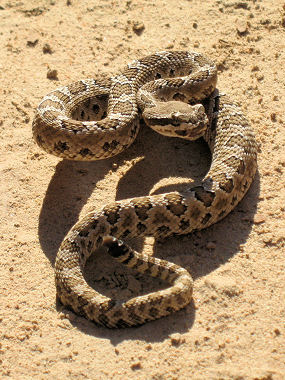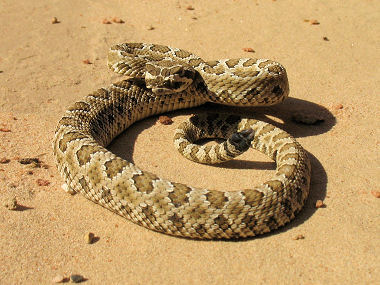The Desert Massasauga is a small
 rattlesnake
with adults typically reaching 18 - 26 inches in length. The head, body and
tail of these rattlesnakes are gray or light brown with with a row of large
rounded brown/black blotches or spots down the centre of the back and three
smaller rows of alternating spots down each side. They have a distinctive, dark
stripe that runs along the side of the head which passes over the eye. The
belly is white or cream. The snake is found in southeastern Arizona, central
and southern New Mexico, and western Texas and typically lives in arid, open
sagebrush prairie, grasslands and rocky prairie hillsides. rattlesnake
with adults typically reaching 18 - 26 inches in length. The head, body and
tail of these rattlesnakes are gray or light brown with with a row of large
rounded brown/black blotches or spots down the centre of the back and three
smaller rows of alternating spots down each side. They have a distinctive, dark
stripe that runs along the side of the head which passes over the eye. The
belly is white or cream. The snake is found in southeastern Arizona, central
and southern New Mexico, and western Texas and typically lives in arid, open
sagebrush prairie, grasslands and rocky prairie hillsides.
|
The Desert Massasauga is protected by Arizona state law. |
Desert Massasaugas active during the daytime in spring and fall,
but are mainly nocturnal during the summer months. It spends much of its time
basking in the sun waiting for food such as lizards, snakes, rodents frogs, and
invertebrates. The snakes mate in the spring and fall and the females bear 5 -
13 live young about 15 weeks later. Like other pit vipers, the snake is
venomous with a more potent toxin than that of many larger species of
rattlesnake. However, because the snake delivers less venom than other rattlers
with each bite, its potential for human harm is greatly reduced.
 |

